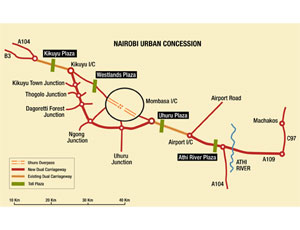Kenyan roads officials say plans for the first toll road in sub-Saharan Africa to be built under a public-private partnership have “collapsed” after the prime financier’s “integrity concerns” about a concession partner have led it to back out of the deal, although the challenged partner, the Austrian construction firm of Strabag SE, denies the plan is dead.
Franklin Bett, the Kenyan roads minister, said in a press conference on Feb. 7 that the toll- road plan, “as envisaged through the consortium, has collapsed.”
The $814-million contract was awarded in 2007 to the Nairobi Motorway Group, a consortium comprising Strabag SE and Israel’s Shikuni-Binui (Housing and Construction Holding Co.), each holding a 50% share. But a year ago, the prime financier, the World Bank—which has provided $460 million to date in guarantees for roads in Kenya—raised unspecified integrity concerns regarding Strabag SE that may have killed the plan.
At the Feb. 7 press conference, Johannes Zutt, the bank’s representative in Nairobi, said, “After completing a detailed review and due diligence on the project and its sponsors, including a compliance review conducted by external counsel, the World Bank found that the systems and approach to compliance procedures would not be commensurate with the circumstances of this project and the governance risks facing this sector. Accordingly, the [World Bank Group] is not prepared to participate in financing the consortium involved in this project as currently structured.”
“If the government of Kenya so desires,” added Zutt, “the World Bank Group would be prepared to finance a concession undertaken by Strabag on condition that Strabag agrees to expand its integrity compliance procedures and training programs to cover the company more completely.”
Despite roads Minister Bett’s declaration of collapse, Strabag has not given up. “We are in fresh negotiations with the World Bank on how all the conditions will be met,” says Diana Klein, a spokeswoman. “We are fully committed to complying with their terms, and we shall work to see the project is done,” she says.
The consortium is to design, construct and operate six segments of the 77-kilometer toll road, as well as a 29-km southern bypass, in a 30-year concession. The highway is to include a 5.9-km, four-lane elevated section passing over the existing Uhuru Highway through the heart of the city. Four toll stations are to be erected and seven roundabouts removed.
Roads Minister Bett says the World Bank’s decision at least lets Kenya explore other plans. “Kenya is happy that the World Bank has at last come up with an official position, and it is now possible for the government to consider other options,” says Bett. He adds that the Nairobi toll-road concession and bypass will be restructured and redesigned and that Kenya is seeking alternative financiers. It is considering a proposal from the Export/Import Bank of China.
The road is part of the Northern Corridor in Kenya, connecting the port of Mombasa with the capital city of Nairobi and continuing on to link the countries of Uganda, Rwanda, Burundi and Democratic Republic of Congo.


Post a comment to this article
Report Abusive Comment